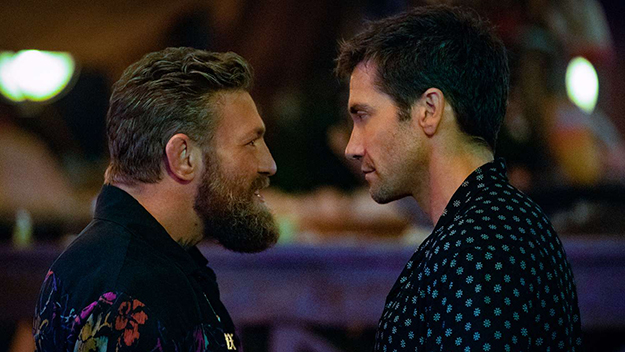Head-to-Head
This article appeared in the April 12, 2024 edition of The Film Comment Letter, our free weekly newsletter featuring original film criticism and writing. Sign up for the Letter here.

Road House (Doug Liman, 2024)
“Nobody ever wins a fight,” proclaimed Patrick Swayze’s NYU-schooled philosopher-turned-bouncer, Dalton, in Rowdy Herrington’s 1989 meathead masterpiece Road House. But with all due respect to a man who’s used to doing things his way (or the highway), sometimes it’s simply irresistible to throw a couple of heavyweights in the ring and see what happens. So choose your fighter: in one corner, an impoverished Indian pit brawler trying to survive his city’s mean streets long enough to avenge his mother’s murder by corrupt cops; in the other, a disgraced ex-UFC star sublimating his guilty conscience—and subsidizing his frequent ER visits—by working security for a raucous biker bar in the Florida Keys.
Doug Liman’s glossy remake of Road House (starring Jake Gyllenhaal) and Dev Patel’s feature directorial debut Monkey Man (which casts the director in the title role) have arrived on the scene more or less simultaneously—near-identical cinematic siblings hailing from twin epicenters of global genre-film production, and both bearing scars from behind-the-scenes battles with monolithic streaming-company distributors. Is it a cosmic coincidence or simply a sign of the times? Either way, it’s a credible opportunity to consider the state of the art. In a year that’s so far been light on passable action offerings (with only David Ayer’s goonish, reactionary Jason Statham vehicle The Beekeeper offering a few flickers of dim-bulb inspiration), Road House 2.0 and Monkey Man are both worthy conversation pieces—so long as they let their fists do the talking.
Pugnaciousness is a running theme in Liman’s filmography, whether as a vocational requirement in assassin thrillers like The Bourne Identity (2002) and Mr. and Mrs. Smith (2005)—both of which featured sequences of hard-hitting, close-quarters combat—or as an existential condition in Edge of Tomorrow (2014), which gave Tom Cruise the role of a lifetime as a man who, having had indestructibility thrust upon him, simply refuses to stay down. Gyllenhaal, of course, isn’t in Cruise’s league as either a movie star or an avatar of self-willed physical transformation. But having previously whipped himself into shape to play an ascendent boxing star in 2015’s Southpaw, he’s still got enough of a shitkicker’s physique beneath his ensemble of gaudy Hawaiian shirts to sell the idea that this postmillennial Dalton can hold his own in a brawl. Meanwhile, in place of Swayze’s relaxed, everything-zen attitude (revealed over the course of Herrington’s film to be a mask for a barely suppressed mania that manifests in primal-screaming, throat-ripping hijinks), Gyllenhaal opts for the thinly veiled weirdness that has lately become his trademark. His gift for soft-spoken comedy remains intact as well: after laying out a bunch of gangbangers sent by the local millionaire failson (Billy Magnussen) to intimidate Dalton’s employers, he sweetly offers to drive them en masse to the hospital.
So total is Dalton’s dominance over the people he’s being paid to keep at bay that his deep-pocketed nemesis, who wants to buy up the valuable real estate around the bar, has to bring in a ringer: the forbiddingly named Knox, in the heavily tattooed personage of Conor McGregor. The MMA icon is such a terrible actor—raw, untutored, and wildly enthusiastic—that he becomes genuinely endearing in spite of the character’s villainy. In fact, the sheer meatheadedness of McGregor’s tour de force is the only thing in Liman’s violent but anodyne movie that connects with—and honors—the fleshy legacy of the original Road House, which holds up mostly on account of its sincerity. Herrington and his crack team of stuntmen weren’t trying to reinvent the wheel, but they took their jobs seriously and crafted a movie in which—to contradict one of the script’s most famous lines—pain did hurt. Liman’s take on the material is plenty gory (including a superfluous and goofy death-by-crocodile sequence), but the depthless digital cinematography and the CGI-assisted fight choreography don’t so much propel the action into the stratosphere as leave it stranded on the far rim of the uncanny valley.
To give Liman some credit, he is willing to shoot in long takes and at a legible distance from the actors, which gives him the directorial edge over Patel, whose everything-everywhere-all-at-
Such progressive rhetoric is hard to resist, especially when yoked to a lurid, propulsive plot about the infiltration of an elite underworld criminal cartel (“you like John Wick?” asks one lowlife, effectively name-checking the script’s main influence). It also helps that Patel is such a soulful camera subject; as in The Green Knight (2021), suffering and masochism only serve to heighten his otherworldly handsomeness (he’s sexiest when chipped around the edges). As allegory, Monkey Man is broad and blunt: the bad guys are styled vaguely as Hindutva nationalists, while our hero adopts the image of the avenging simian god Hanuman—a figure also invoked in S.S. Rajamouli’s RRR (2022)—to counteract their hijacking of religious piety. The script’s simplification of contemporary Indian politics aside, there’s something fraught and underdeveloped in the way it advocates for self-actualization—and ideological righteousness—through relentless violence.
Monkey Man was released last weekend by Universal in tandem with Jordan Peele’s production company Monkeypaw. Liman, who took to the media to rip Amazon for not releasing Road House theatrically, surely envies his competitor’s modest but successful multiplex rollout. One result of Patel’s relentless aesthetic in Monkey Man is that it keeps us so close to the action that even critical contemplation feels impossible. If his straightforwardly bludgeoning approach represents a sort of triumph over the smarmy, blandified likes of Road House, it’s still arguably self-defeating—less a case of cinematic sweet science than style pummeling substance into a bloody pulp.
Adam Nayman is a teacher and author based in Toronto, as well as a contributing editor to Cinema Scope and a critic for The Ringer.







